 Adam Feltz has co-authored an article “The Means/Side-Effect Distinction in Moral Cognition” which was accepted for publication in the journal Cognition.
Adam Feltz has co-authored an article “The Means/Side-Effect Distinction in Moral Cognition” which was accepted for publication in the journal Cognition.

Michigan Tech is inviting K-12 teachers and administrators to a workshop in August, to help them find ways to bring computer science and programming into their classrooms. The workshop, supported through a Google CS4HS (Computer Science for High Schools) grant, exposes teachers to exciting new ways to bring computer science into schools.
This is the third year Google has supported a computer science workshop at Michigan Tech for teachers.
“As computer technology becomes an ever more powerful and pervasive factor in our world, students need instruction in the creative problem-solving skills that are the basis of computer science,” explains Linda Ott, (CS) director of the workshop.
“Software design and programming skills, along with an understanding of the principles of computer systems and applications, are tremendously valuable in a wide range of future careers, and the problem-solving process of computational thinking can be used to enrich a wide range of K-12 courses. New tools and teaching materials make it possible to bring the creative spirit of computing into K-12 classrooms.
“From a teacher’s perspective, however, bringing computer science into the classroom can seem intimidating,” Ott goes on to say.
“We want to help teachers develop confidence in their own computer science literacy and help them craft a computing curriculum that meets their teaching missions.”
The workshop will cover a basic understanding of computer science principles, help teachers integrate programming into new and existing courses, disseminate K-12 computer programing course materials developed at Michigan Tech and provide tools for increasing interest in computing among young women.
Participants will receive lunches, a stipend to help with travel and other expenses, and a year of assistance in course development from a Michigan Tech computer science graduate student. Out-of-town teachers will receive free accommodation at the Magnuson Franklin Square Inn.
For more information or to apply, click here.
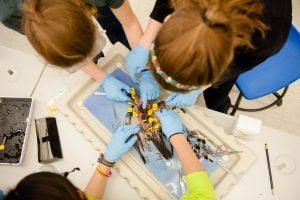 Registration is open for 2017 Summer Science Camps at Michigan Tech’s Great Lakes Research Center and Nara Nature Center.
Registration is open for 2017 Summer Science Camps at Michigan Tech’s Great Lakes Research Center and Nara Nature Center.
There are three-day Summer Science Camps for students entering grades 1-5.
Three sessions are offered, and students may enroll for more than one. Camps begin June 13.
 Find out what teams are doing. Many are partnered with Michigan Tech faculty and departments, including CEE, SFRES, etc.
Find out what teams are doing. Many are partnered with Michigan Tech faculty and departments, including CEE, SFRES, etc.
The public is invited to attend one of these upcoming LSSI-sponsored community events. Contact Joan Chadde or the lead teacher for more information or directions.
- 9 a.m. – 2 p.m. June 1-2. Houghton High School – School Forest Research Project Presentations in high school auditorium. (Lauri Davis, lead teacher)
- Noon to 2 p.m. June 2, Washington Middle School, Calumet Township Park (Darrell Hendrickson, lead teacher).
- 6 to 7:30 p.m. June 5, Baraga Middle/High School outside the school building. Fun Run, Veggie Kabobs, Garden/Greenhouse Tours. (Lori Wisniewski and Ben Johnston, lead teachers.
Kudos to all the great stewardship work going on and the hard work of LSSI teachers to provide a rich learning environment for their students.
Every year the Network of Michigan Educators invites the Teacher Education faculty to nominate and honor their top pre-service teachers as “Teachers of Promise”. This year the faculty 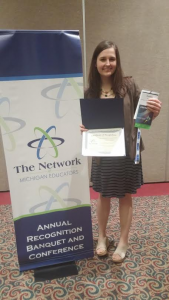 nominated Kaitlin Kogut, who completed her final semester with the program as a student teacher in Houghton High School. Kaitlin completed her degree in Biological Sciences Secondary Education and Integrated Science Teaching. She is also a member of Michigan Tech Leading Scholars.
nominated Kaitlin Kogut, who completed her final semester with the program as a student teacher in Houghton High School. Kaitlin completed her degree in Biological Sciences Secondary Education and Integrated Science Teaching. She is also a member of Michigan Tech Leading Scholars.
Kaitlin accepted her award at the Annual Recognition Banquet and Conference in Lansing last month, stating “I learned about advocating for students through social media, alternative school models aimed at reaching every student, and digitizing the classroom. I was able to participate in conversation in each of these sessions using the knowledge I gained in Teacher Education classes at Michigan Tech.” Congratulations, Kaitlin!
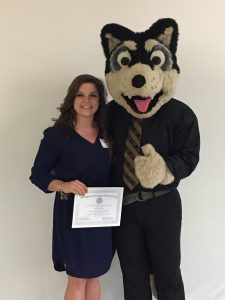 Every year, each academic department nominates one student to represent their department as its Departmental Scholar. The Provost’s Award for Scholarship is given to a senior who best represents student scholarship at Michigan Tech. This outstanding student is considered excellent not only by academic standards, but also for participation in research scholarship activity, levels of intellectual curiosity, creativity, and communication skills.
Every year, each academic department nominates one student to represent their department as its Departmental Scholar. The Provost’s Award for Scholarship is given to a senior who best represents student scholarship at Michigan Tech. This outstanding student is considered excellent not only by academic standards, but also for participation in research scholarship activity, levels of intellectual curiosity, creativity, and communication skills.
Halie Hart is exactly the kind of student that exemplifies Michigan Tech, our mission, and our department scholars. Halie is majoring in Psychology and minoring in Law and Society. Her intellectual curiosity that drives her to master material, her problem solving skills, and her discipline have made her an excellent student and scholar in the Department of Cognitive and Learning Sciences. These feats alone would be impressive. However, they are even more impressive given that Halie is at the top of her class in terms of GPA while also being a college athlete as member of the volleyball team. We expect great things from her going forward, as she plans to continue her education and has the potential to be an outstanding scholar at the graduate level as well.
Halie is a natural leader. Halie was recently inducted into Psi Chi, the International Honor Society in Psychology. She has since taken on the role of President in both Psi Chi and the MTU student organization Association of Psychology Students (APS). As with most student orgs, they have peaks and valleys in terms of organized activities, student commitment, etc. Halie is working hard to revitalize both organizations and provide quality programming in the upcoming semesters. Dr. Steelman, the advisor to these organizations, stated that Halie is breathing new life into these groups in a way that she has not seen from another executive officer in her time as advisor. Congratulations, Halie!
 Dr. Myounghoon “Philart” Jeon, Associate Professor in the Department of Cognitive and Learning Sciences and the Department of Computer Science, published his first handbook titled “Emotions and Affect in Human Factors and Human-Computer Interaction” with Elsevier publishing company on April 5th, 2017.
Dr. Myounghoon “Philart” Jeon, Associate Professor in the Department of Cognitive and Learning Sciences and the Department of Computer Science, published his first handbook titled “Emotions and Affect in Human Factors and Human-Computer Interaction” with Elsevier publishing company on April 5th, 2017.
“Emotions and Affect in Human Factors and Human-Computer Interaction“ is a complete guide for conducting affect-related research and design projects in H/F and HCI domains. Introducing necessary concepts, methods, approaches, and applications, the book highlights how critical emotions and affect are to everyday life and interaction with cognitive artifacts. The text covers the basis of neural mechanisms of affective phenomena, as well as representative approaches to affective computing, Kansei engineering, hedonomics, pleasurable product design, and emotional design.
Dr. Jeon is the founding director of the Mind Music Machine Lab. He also serves as a Director of the Center for Human-Centered Computing at the Institute of Computing and Cybersystems at Michigan Tech. His research focuses on HCI (Human-Computer Interaction) and HRI (Human-Robot Interaction), including Auditory Displays, Affective Computing, Assistive Technologies, Automotive User Interfaces, and Aesthetic Computing. His research has yielded more than 150 publications across top peer reviewed journals and conference proceedings. His research is currently supported by NIH (National Institutes of Health), DOT (Department of Transportation), FRA (Federal Railroad Association), Hyundai Motors Company, Equos Research Co., LTD., and MTTI (Michigan Tech Transportation Institute). Dr. Jeon teaches Affective Design and Computing, Human Factors, Human Fact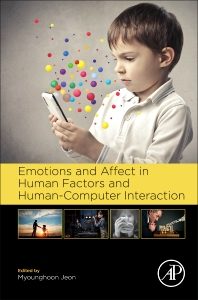 ors II: Multimodal Design and Measures, Human-Robot Interaction, and Human-Centered Design, among others. He serves as an Associate Editor of MIT Press Journal, Presence: Teleoperators and Virtual Environments and Affective Design Technical Committee of International Ergonomics Association (IEA). He has recently guest-edited journal special issues in “subliminal perception” (Presence) and “social cars and connected vehicles” (Pervasive and Mobile Computing), “arts and aesthetics in VR (Presence), and “sonic information design” (Ergonomics in Design). He actively works in international conferences – chairing programs and sessions, organizing workshops, and serving as program committee in AutomotiveUI, ICAD, HFES, CHI, MobileHCI, UbiComp, and PersuasiveTech.
ors II: Multimodal Design and Measures, Human-Robot Interaction, and Human-Centered Design, among others. He serves as an Associate Editor of MIT Press Journal, Presence: Teleoperators and Virtual Environments and Affective Design Technical Committee of International Ergonomics Association (IEA). He has recently guest-edited journal special issues in “subliminal perception” (Presence) and “social cars and connected vehicles” (Pervasive and Mobile Computing), “arts and aesthetics in VR (Presence), and “sonic information design” (Ergonomics in Design). He actively works in international conferences – chairing programs and sessions, organizing workshops, and serving as program committee in AutomotiveUI, ICAD, HFES, CHI, MobileHCI, UbiComp, and PersuasiveTech.
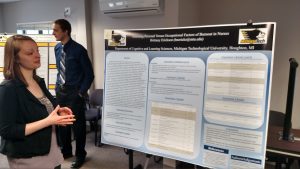 Brittany Erickson, a 2016 graduate of the Psychology program, was selected to present her work that stemmed from a project she created in Dr. Shane Mueller’s Research Methods and Statistics course last spring. The conference is for The Honor Society of Nursing, Sigma Theta Tau International (STTI), who will hold their 44th Biennial Convention this fall in Indianapolis, Indiana.
Brittany Erickson, a 2016 graduate of the Psychology program, was selected to present her work that stemmed from a project she created in Dr. Shane Mueller’s Research Methods and Statistics course last spring. The conference is for The Honor Society of Nursing, Sigma Theta Tau International (STTI), who will hold their 44th Biennial Convention this fall in Indianapolis, Indiana.
STTI represents nurses and is the single largest group of healthcare professionals in the world. Their goal is to provide introduction and access to new healthcare knowledge and resources. Erickson’s study focused on the risk factors and consequences of occupational burnout among nurses. Some questions that are quantitatively and qualitatively addressed are: “How is their clinical decision making affected by burnout?” and “What are the professional and personal ramifications?”
Her poster will be displayed on-site and will also be included in the Virginia Henderson Global Nursing e-Repository to be used as a resource for continuing nursing education after the conference.
 Applied Cognitive Science & Human Factors student Madeline Peabody will defend on Friday, March 31 from 12:00 pm to 1:00 pm in Meese Center 109. Her advisor is Elizabeth Veinott.
Applied Cognitive Science & Human Factors student Madeline Peabody will defend on Friday, March 31 from 12:00 pm to 1:00 pm in Meese Center 109. Her advisor is Elizabeth Veinott.
Title: Improving Planning: Quantitative Evaluation of a Premortem in Field and Laboratory Settings
Abstract: Planning can be difficult and developing techniques for evaluating plans has been limited. This thesis compares different plan evaluation techniques in a series of experiments.
The main techniques discussed are the Premortem Method and Worst-Case Scenario Method. The Premortem plan evaluation method can help people reduce overconfidence and generate more reasons a plan might not succeed. Only one experiment has validated this technique; therefore, one goal of the present series of experiments is to qualitatively and quantitatively examine the effectiveness of the Premortem Method in several different planning situations.
This research evaluates the extension of the Premortem to shorter planning time periods, evaluates the effectiveness with team generated and executed plans, and compares the use of this technique among individuals and teams. In Experiment 1, 52 Army Cadets operating in teams completed six time-constrained field exercises that required planning, half using the Premortem and half using a standard Military plan evaluation process. Compared to a control condition, when teams used the Premortem they had fewer fouls and less fixation with no change in execution time. In Experiment 2, 72 individual participants from university organizations used the Premortem Method or Worst-Case Scenario Method to evaluate their group’s plan for an engineering task.
Results from Experiment 2 indicated that there was no statistically significant difference in the number of reasons and solutions generated between methods. To further examine the relative effectiveness of these two plan evaluation methods, and the influence of group dynamics, Experiment 3 compared the efficacy of the Premortem and Worst-Case Scenario Method among groups and individuals in face-to-face settings with a complex and unfamiliar plan. Eighty-two participants generated more reasons with the Premortem Method than the Worst Case Scenario Method, and groups generated more solutions than individuals did.
Overall, the participants in groups using the Premortem Method produced more reasons and solutions than participants using the Worst-Case Scenario Method and individual participants using the Premortem Method. These studies extend prior work by validating that the Premortem is effective in short planning horizons, demonstrating that it works for individuals and teams, and clarifying potential boundary conditions. This research advocates several directions for future research, and suggests possibility of future implementation as a virtual tool or application.
 The Department of Cognitive and Learning Sciences and the William G. Jackson Center for Teaching and Learning (CTL) have developed a new course entitled “Foundations of Online Teaching.” Beginning in Spring 2018, it will be offered in spring and summer semesters as ED5101, but this summer, it will be offered during Track A as a special topics (ED5540) section with the same name.
The Department of Cognitive and Learning Sciences and the William G. Jackson Center for Teaching and Learning (CTL) have developed a new course entitled “Foundations of Online Teaching.” Beginning in Spring 2018, it will be offered in spring and summer semesters as ED5101, but this summer, it will be offered during Track A as a special topics (ED5540) section with the same name.
In order to promote best practices in online teaching, the CTL has been authorized to annually provide $500 in additional compensation to up to 20 faculty members and GTAs who enroll in this course to improve their online instruction. Full-time faculty must enroll in the course as normal and may refer to the Employee Education Program or tuition reimbursement information. GTAs or part-time faculty would need to enroll in the course as a normal one credit class.
All participants wishing to receive compensation must, no later than the end of the first week of the course, provide communication from the appropriate chair or dean indicating their involvement in online teaching within their unit (should the compensation limits be reached, the time of receipt of this letter will determine priority). Individuals must also complete the course with a B grade or better before receiving the additional compensation.
In addition, those completing the course (or who can show equivalent education/experience) will become exclusively eligible for additional grant money (beginning late Summer 2017) to support the development or revision of online courses.
Funding for this program comes from the Online Learning Technology Fee through a cooperative effort between Information Technology and the CTL. Questions about Michigan Tech’s Employee Education Program can be directed to Benefits Services. Questions about the course or the $500 in additional compensation can be directed to Tom Freeman.